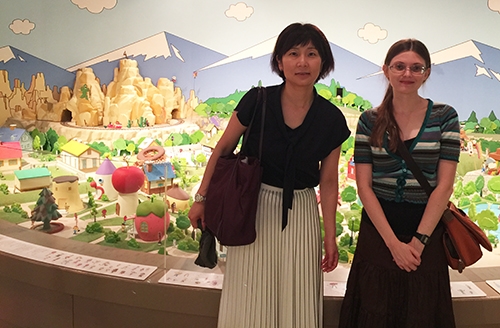
Breanna Morrison had never really traveled outside the United States before she received a National Science Foundation fellowship that took her to Japan last summer. She collected data there to test a hypothesis about cultural differences in perceptions about mathematics.
Morrison is a University of Arkansas fourth-year doctoral student in the educational statistics and research methods program in the College of Education and Health Professions. She wanted to find out whether results of a survey used to study attitudes about math could be compared across nations. In other words, did the survey instrument, which is called Dweck Mindset Instrument, measure the same ideas in different cultures?
Before she went to Japan, Morrison surveyed 407 Fayetteville students about their attitudes about math, in particular whether they thought being smart in math is a quality people are born with or whether they can improve it with study. While the school year here finishes in May, students in Japan attend school through July so she headed overseas in mid-June. She stayed for about two months in a town near Kyoto similar in size to Fayetteville, working with researcher Ayumi Tanaka.
Morrison found Tanaka through a database of researchers in Japan before applying for funding for the project. They surveyed 426 students in Japan.
"We were able to get both samples at the end of the school year," Morrison said. "This is important because attitudes could change between the beginning and the end of the school year."
The Dweck Mindset Instrument seeks to measure attitudes about the nature of intelligence that may relate to academic outcomes. Other studies of this particular instrument have looked at attitudes of people within a country toward traits such as persistence and diligence. However, not much research has been done to see how it measures differences across cultures, Morrison said.
"There is even less on analyzing the psychometric differences that may exist between different countries' responses to the instrument," she said. Psychometrics refers to the theory and technique of psychological measurements, which includes the measurement of knowledge, abilities, attitudes and personality traits.
While some people believe that aptitude for a subject such as math is innate, others believe intelligence can grow if a person puts more than ordinary effort into the process, Morrison explained.
She found the mindset measure correlated to other, more traditional academic attitudes such as perceived control, self-concept and self-efficacy. However, the Dweck Mindset Instrument was better at measuring mindset within a culture than when it was used to compare mindset of people in two countries.
"Too often, there are incorrect assumptions made when using measurement tools on participants who the measure was not initially tested on," Morrison said.
If a measurement instrument is found to measure the same construct in different groups, the scores from the two groups can be compared, but this was not the case for this measure.
For example, results suggested the Japanese students viewed intelligence as more innate than Americans did but the measurement did not meet strict enough psychometric standards to find that these two means could be compared. That is, the measurement may not be measuring the same construct across these two cultures in the same way, meaning that there is not enough confidence to compare the groups' mindset scores, Morrison said.
She will present her research at the annual conference of the Association for Psychological Science in May. She plans to expand it to an online survey of college students.
Topics
Contacts
Heidi S. Wells, director of communications
College of Education and Health Professions
479-575-3138,